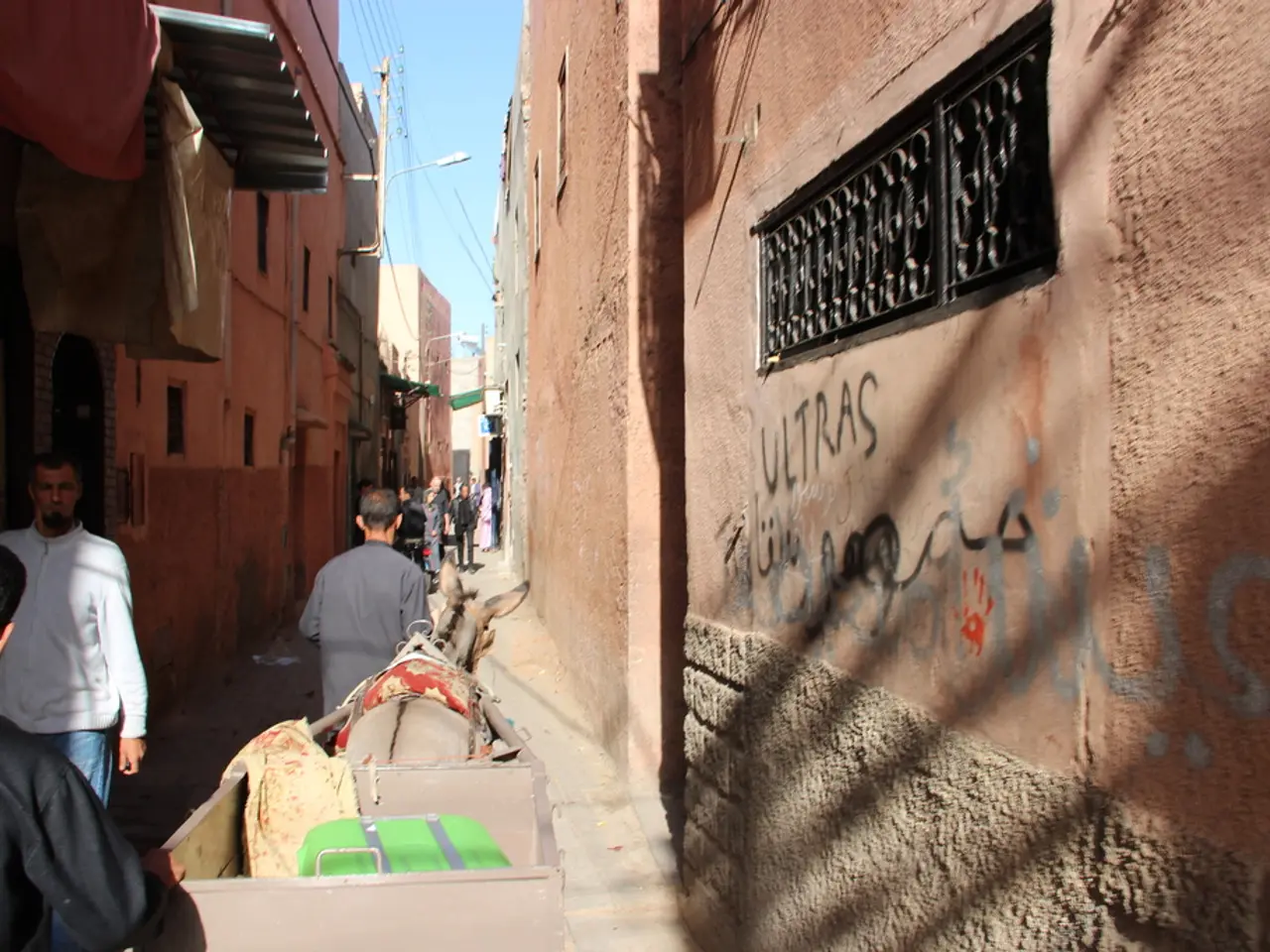Israel enacts additional limits on endeavors to supply food to Gaza's civilian population
In the ongoing conflict in Gaza, aid organizations have accused Israel of impeding efforts to provide essential supplies to the civilians in need. The allegations primarily revolve around new bureaucratic restrictions that have significantly hindered the delivery of humanitarian aid.
Obstruction of Aid Delivery
Aid organizations, including Doctors Without Borders/Médecins Sans Frontières (MSF) and others, claim that despite Israeli authorities asserting there are no limits on humanitarian aid entering Gaza, most major NGOs have been unable to deliver lifesaving supplies. This obstruction has left millions of dollars' worth of food, medicine, water, and shelter items stranded in warehouses across Jordan and Egypt [1][2].
New Registration Rules
Israel introduced new registration rules for international non-governmental organizations (INGOs) in March 2025. These rules permit registration denial based on vague criteria such as alleged "delegitimization" of the state of Israel. Many NGOs view this as a politicized attempt to control independent organizations and silence advocacy efforts [1][2].
Restrictions on Palestinian Employees
International NGOs are required to share sensitive personal information about Palestinian employees to secure registration, which often contradicts the domestic legislation of the NGOs' home countries. This requirement affects their ability to protect civilians and operate effectively [3].
Specific Bureaucratic Restrictions
- Non-Authorization for Aid Delivery: Dozens of NGOs have been denied authorization to deliver aid, with over 60 requests rejected in July alone. These organizations have worked in Gaza for decades and are trusted by communities [1][2].
- Blocking of Supplies: Essential supplies like food, medicine, and shelter items are blocked at entry points, worsening malnutrition and starvation. The situation is severe, with famine thresholds reached in most of Gaza [4][5].
- Registration Process: The new registration process is seen as a tool to restrict the operations of INGOs, making it difficult for them to function effectively in the Gaza Strip [3][4].
Israel requires humanitarian organizations to submit a list of all Palestinian staff for vetting. Visas can be denied if senior officials of the humanitarian groups have voiced support for boycotts against Israel. According to Cogat, most victims had serious pre-existing medical conditions that worsened independently of nutrition levels [6].
The UN's humanitarian agency states that the amount of aid entering Gaza is "far below the minimum required to meet people's immense needs" [7]. The UN and food security experts have warned that starvation and malnutrition in Gaza are at the highest levels since the war began [8].
In response, the European Union, Britain, and Japan have called for urgent action to alleviate the humanitarian crisis in Gaza, while seventeen EU countries, including Ireland, have signed a joint statement demanding Israel to provide authorization for all international NGO aid shipments and to unblock essential humanitarian actors from operating [9].
Officials from Cogat conclude that these cases do not reflect the overall health situation in Gaza, but selectively highlight extreme cases involving chronic illness [10]. However, the aid organizations argue that these restrictions are making the situation worse, contributing to the suffering of Gazan civilians and exacerbating the humanitarian crisis in Gaza.
References: [1] https://www.aljazeera.com/news/2025/3/31/israel-denies-entry-to-aid-groups-in-gaza [2] https://www.reuters.com/article/us-israel-palestinians-gaza-aid/israel-denies-entry-to-aid-groups-in-gaza-idUSKBN2D325O [3] https://www.amnesty.org/en/latest/news/2025/03/israel-new-restrictions-on-ngos-undermine-rights-work-in-gaza/ [4] https://www.un.org/unrwa/newsroom/press-releases/unrwa-condemns-recent-israeli-actions-in-gaza [5] https://www.nytimes.com/2025/07/20/world/middleeast/gaza-hunger-crisis.html [6] https://www.timesofisrael.com/idf-says-hamas-exaggerated-claims-of-famine-in-gaza/ [7] https://www.unocha.org/un-humanitarian-agency-calls-for-urgent-action-to-alleviate-the-humanitarian-crisis-in-gaza/ [8] https://www.bbc.com/news/world-middle-east-58458131 [9] https://www.euractiv.com/section/global-europe/news/eu-calls-for-urgent-action-to-alleviate-the-humanitarian-crisis-in-gaza/ [10] https://www.timesofisrael.com/idf-says-gaza-malnutrition-deaths-exaggerated-by-hamas-health-ministry/
- The obstruction of aid delivery, as a result of new bureaucratic restrictions and registration rules for international non-governmental organizations (INGOs), has left millions of dollars' worth of essential supplies, such as food, medicine, water, and shelter items, stranded in warehouses across Jordan and Egypt, worsening the humanitarian crisis in Gaza.
- Politics and war-and-conflicts intertwine in the Middle East as the European Union, Britain, and Japan have called for urgent action to alleviate the humanitarian crisis in Gaza, while seventeen EU countries, including Ireland, have signed a joint statement demanding Israel to provide authorization for all international NGO aid shipments and to unblock essential humanitarian actors from operating. This unfolding situation, involving crime-and-justice and general-news, is being closely monitored by the United Nations and various aid organizations.







